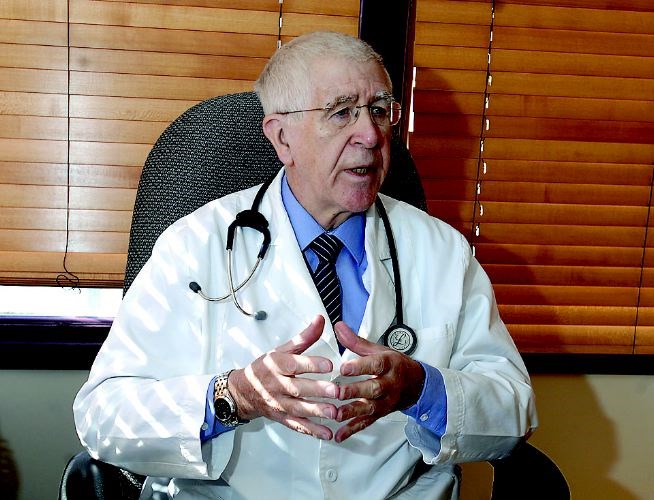Dr. Bert Kelly is being remembered by friends and colleagues as a tireless but eloquent advocate for healthcare in northern B.C.
He died Tuesday night after battling cancer for the last several months.
Kelly was a family doctor who played a leadership role in establishing the Northern Medical Society, an organization dedicated to ensuring equality of care for northern residents. The society played a key role in establishing the Northern Medical Program at UNBC, in supporting the creation of the B.C. Cancer Centre for the North and many other health initiatives.
“We consider him one of the heroes of the medical community of the north,” said Dr. Jan Burg, a friend of Kelly’s.
“He’s done more to change medical services in Northern Health than anybody.”
Kelly played a key role in the walk-out of Prince George physicians in 2000, after a lengthy period of lobbying the provincial government for resources to recruit and retain health professionals in the region.
“We felt that in 1999, that we had reached a crisis,” said Dr. Bill Simpson, who remains an active member of the Northern Medical Society.
Simpson said that, at the time, there were only 17 surgeons serving the regional population. Doctors were leaving town at alarming rates.
The walk-out led to a $10-million agreement with the then-NDP government. The agreement was a turning point for health services in northern B.C., and was announced on June 22, 2000, the same day as a rally of 6,000 Prince George residents filled CN Centre in support of the demands of the doctors.
“It actually set the tone for changes in B.C. Before that rally and before the success of the Northern Medical Society, there was no such thing as payment for on-call physicians,” Burg said.
“It was very moving to see the entire community be so supportive of physicians,” Dr. Michelle Sutter said.
She was one of several physicians who worked with Kelly to organize the rally.
A plaque commemorating the June 22, 2000 rally now sits in the Dr. Donald Rix Northern Health Sciences Centre, the building which houses UNBC’s Northern Medical Program.
Kelly would continue his advocacy for northern health services for over a decade and a half after the rally. He was known to deliver his “Kelly Report” at the annual Bob Ewert Memorial Dinner, a fundraising event for the Northern Medical Programs Trust. Kelly would often give an analysis of the state of northern health each year, often using the occasion to bring the needs of the medical community to the attention of government officials in attendance.
“He would always highlight the positives and then the negatives and effectively shame our politicians into action for the things that needed to be done to improve healthcare,” UNBC’s head of the Northern Medical Program, Dr. Paul Winwood, said.
Winwood was initially drawn to UNBC partly because of the work of Kelly, whose efforts helped lead to the establishment of the Northern Medical Program. The program is dedicated to training and retaining health professionals locally.
Burg referred to Kelly’s style of advocacy as being a “fist in the velvet glove.”
“He was actually a quietly spoken, gentle man, but was incredibly persuasive and assertive in his arguments,” Winwood said.
Kelly’s illness prohibited him from giving his report this past April, during the most recent Ewert dinner. The report was instead delivered by Simpson, and focused on the need for retention and training of physiotherapists in northern B.C.
“The physio issue in the north is dire,” Simpson said in a phone interview Wednesday.
He said that the issue was of prime concern for Kelly over the last year.
There are currently 104 physiotherapists working in northern B.C., the lowest number by far of all other health regions in British Columbia. Nine towns in the region do not have publicly funded physiotherapists.
But aside from his advocacy, many simply knew of Kelly as an attentive, well-dressed family doctor. Sutter said that many in the community simply respected Kelly for the relationships he developed with his patients.
“Bert was one of a kind. When people like him pass away, the world is a little darker but it’s still a better place because of the way he lived his life,” she said.
Kelly is survived by his wife and daughter.



